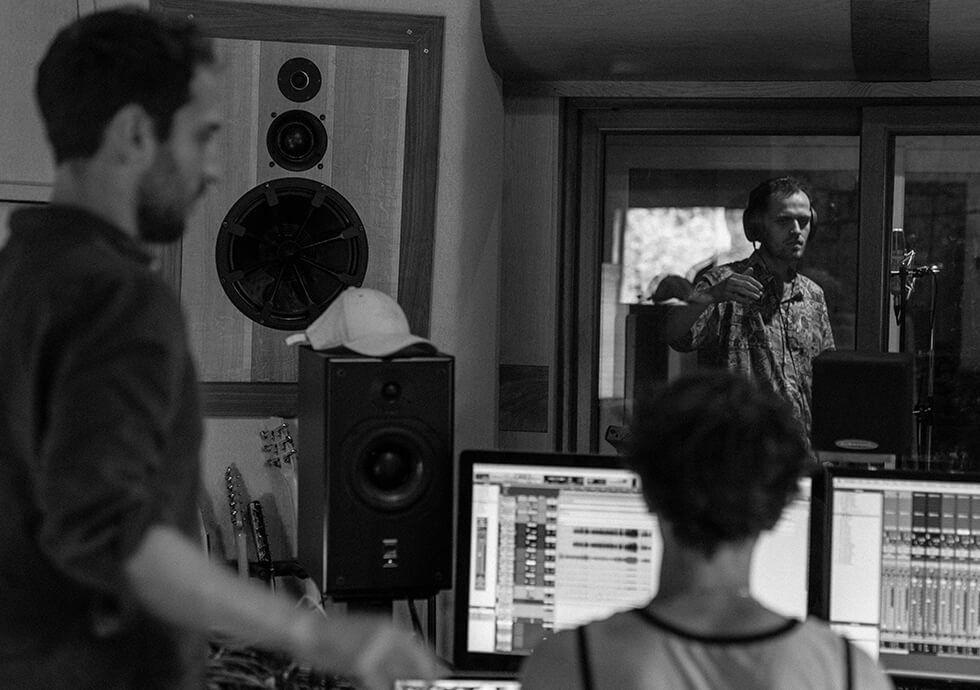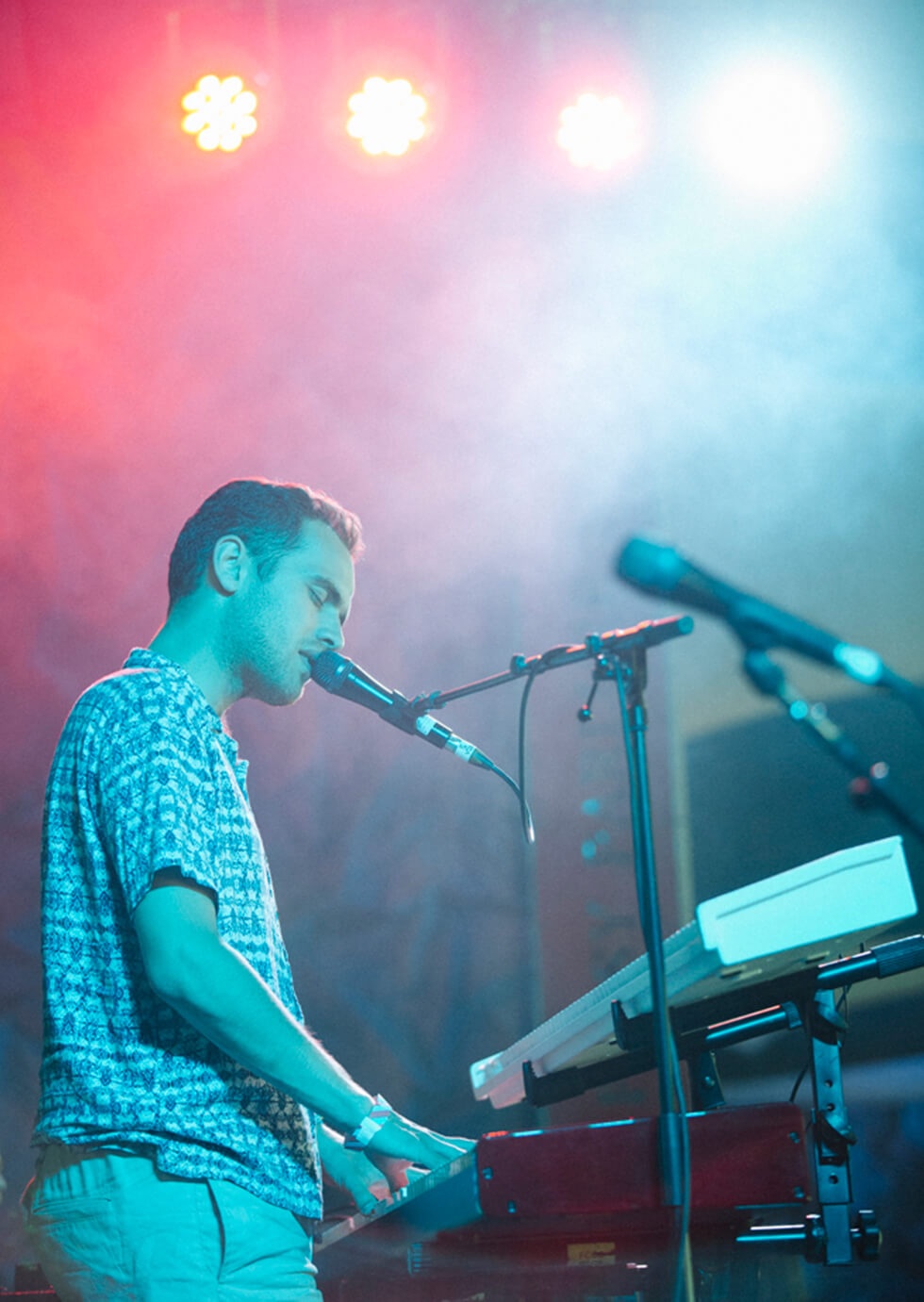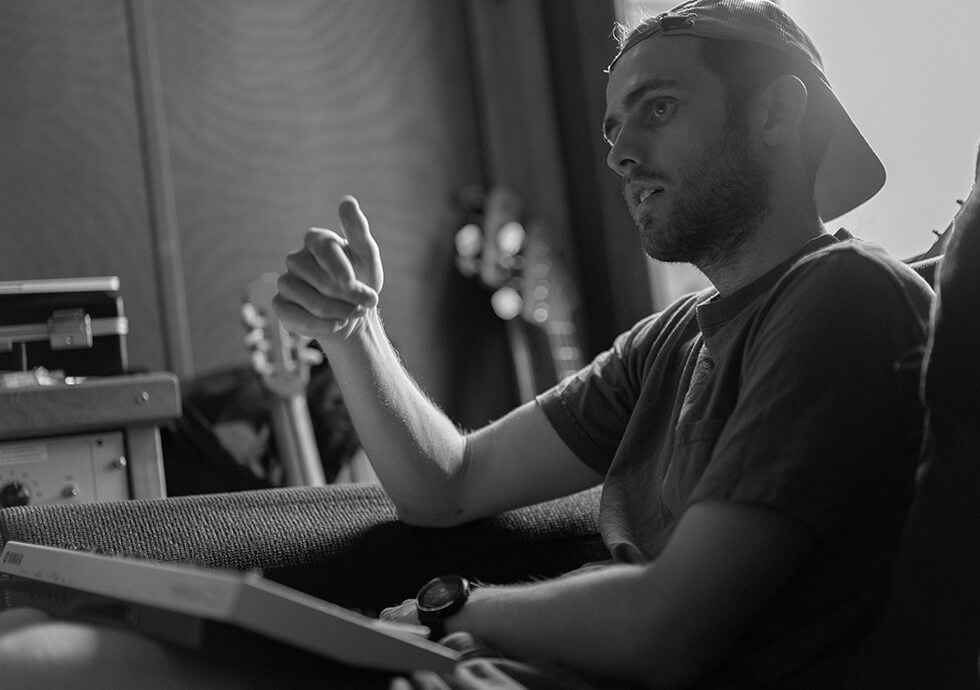Jordan Rakei finds himself
Between meticulous studio sessions and spontaneous live performances, Jordan Rakei is finding the balance.
For musicians and gig-goers alike, the communal experience of a live show is incomparable. Plugging in a pair of headphones can give you an immersive and meditative experience, but live music takes that one step further, putting you right among the reverberating sounds of your favourite songs.
Jordan Rakei is no stranger to the meditative power of live music. The multi-instrumentalist, singer and song-writer’s discography boasts a blend of trance-like soulful sounds and engulfing jazz and hip-hop rhythms that echo through concert venues. Now, with his fourth full-length album ‘What We Call Life’ due in September, and a UK and EU tour in 2022, we’re keen to understand how disparate the worlds of recording and performing are for Jordan. “I approach the creative process quite differently,” he says. “I like to imagine the song in its own world in a recorded state. I’m never thinking ‘can I do this live? Can I recreate all these layers?’”
“In the studio, I might put six guitar layers, three synths, two basses, and two different drum parts because I feel like that’s what the song needs,” he continues. “Then when it gets to rehearsals for the live show, I think, ‘how am I going to do this all live?’. My creative process is very much ‘what does this song need in its recorded state?’. Then, once I’ve finished it all, I turn into the ‘live stage mode’ and think about how I can recreate this sort of energy in a live setting.”

Inevitably, such complex layering in recording requires a collaborative effort from multiple instrumentalists, both live and in session. “I’ll usually be there in the session directing the vision of where I imagine their part going, but a lot of the time it’s very controlled. Every layer is really highly thought over and it’s quite a meticulous and algorithmic way of making music.”
Although Rakei’s recording process is very controlled, the collaborative experience of working with different musicians brings about a welcome contrast when he takes these songs to the stage.
“The live show is quite different. We have our parts, but every show is different. It’s more expressive because we’re bouncing off of the crowd’s energy."
"But in essence, because I can control every element when I’m recording and this is going to be recorded in time forever, I feel like every part needs to be highly considered.”
After the carefully considered album recording process, Rakei is then able to reinvent these songs in live performances. He notes that the songs often take on new arrangements on stage, as the band members develop new ideas and new ways of building tension and release. “There are some shows that I remember vividly, where I might really extend an intro where it’s just a droning, atmospheric moment,” he recalls. “Sometimes, I’m not even singing, I’m just lost in a wall of sound. I’m trying to get to that more now. I want to be a bit freer and less contained in the live setting. Because my creative process when making music is so rigid, I’d rather be more open and freer in the live setting.

The freedom that Rakei’s looking for can often be found in his more introspective moments making music on his own. “A lot of the time when I’m playing music by myself, I get in these zones. For example, I might write a song on the piano and then I turn it into a song later, but when I’m on the piano, sometimes I feel as though I’m sort of watching it all happen and it slowly morphs into a song.”
When playing live, Rakei finds those moments of freedom too, but sometimes self-awareness sets in and interrupts his mental flow. “We’re playing as a band, but sometimes I can be hyper analytical, thinking ‘I can see that person in the first row looking at me’. I get in my head a lot. Other times, I’ve come off the stage and thought, ‘wow, I don’t even remember what happened, I just played my keyboard and sang’. I’m always conscious of this."
"As I’m the singer, there needs to be an element of me being the frontman and being exciting, but at the same time, I get so lost in my own little space behind my keyboard, I forget that I’m performing. Sometimes I feel quite detached from being that entertainer, I just get lost more in the music.”
Intuitive performance
That ability to get lost in the music often transcends the purely auditory experience and moves into a somewhat multisensory territory in Rakei’s performances. The lines between sight, touch and sound become blurred. “There’s one track of mine called ‘Mantra’ which has this really slow build in the intro, but in the live version it’s triple that length. I try and imagine that the drone that’s echoing around the venue is encompassing me, sort of swallowing me up. My voice at times becomes the vehicle for this melody and I’m singing, but sometimes I’m feeling the sound. It’s so loud that I can feel the vibration.”
The encapsulating feeling of Rakei’s music echoes that of a trance-like, meditative state. “I’ve definitely had moments on stage where I feel like I’m in a transcendental state, like an out of body experience, where I feel like I’m watching myself from above,” he recalls. This feeling is one that Rakei has had a lot of experience with, as he has been practicing meditation for the past seven years, and in turn, this has influenced how he makes and performs music. From his debut album until now, the sounds of meditative music, drones and binaural beats have stay with Rakei. “My music shifted when I started meditating. That was when I started writing my debut album ‘Cloak’. Lyrically, I talk about my discovery of meditation. I loved walls of sound, atmospheres and drones filling out space because it reminded me of the earlier days when I started meditating.”

Occasionally, Rakei takes his performances off of the stage and moves into a virtual setting which plays into the therapeutic and transcendental power of isolated solo performance. During lockdown, Rakei turned to Patreon to give live performances and insights into his processes in his studio. He notes that he often doesn’t think about the audience or lack thereof in these scenarios. “In a way, there’s no one to bounce off of. There’s no crowd energy to go in a specific direction, but at the same time, because I’m still quite socially anxious or shy or introverted at times, I can sometimes never really feel like I can be myself on stage. That takes a true level of comfort which happens here and there in my live shows, and I just get lost in the music.”
In this way, these virtual performances provide him with a space to shed that sense of self-awareness. Rakei recalls of a 30-minute meditative ambient Patreon set.
“It was a journey. I went into it thinking ‘I don’t know what I’m going to do, but I’m just going to let this next 30 minutes just be a true expression of my subconscious’."
"There’s a whole meditative creative scene where you let the subconscious do the talking rather than meticulously making these decisions. Whatever wants to come out of your voice or your hands, you have to let that come out, there’s no judgement. I was trying to do that as an exercise. I really felt truly comfortable because I felt that no one was there to judge me. I didn’t feel like I couldn’t be myself. In a way, I actually feel more comfortable with those performances.”
This conflict between presenting as a compelling frontman but staying true to his introspective tendencies as a performer is something that Rakei is very aware of. “I think that I’m truly more of a producer and an instrumentalist, but I’ve been lucky enough that I can sing as well, so I’m now tasked with this more front-facing role where people are connecting with me. I think I’m much more of a studio producer ‘behind-the-scenes’ sort of musician, but because I sing, I’m drawn right to the front.”
In Rakei’s opinion, most singers are quite charismatic, especially in the scene of music that he’s involved in, but to him, the most important thing is that he stays authentic to his character as a musician. “I’m constantly in that battle of trying to get lost in the music but also making sure that everyone is getting a good show, but I will happily be with my band at the back playing keyboard behind the singer. Then I could fully get lost in the music without having to think about looking a certain way or doing anything visually, I could just truly be in the experience.”
Connect with Jordan Rakei on Instagram
Connect with Jordan Rakei on Spotify
Words: Zainab Hassan

